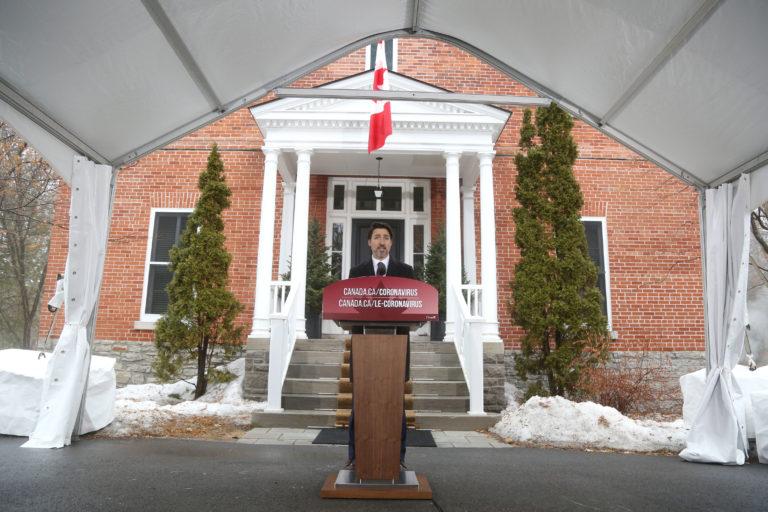Trudeau’s Saturday update on the coronavirus in Canada: Full transcript
The Prime Minister provides his daily briefing: Northwest Territories limits non-essential travel while work continues to bring Canadians home from Peru, Spain, Morocco and elsewhere

Justin Trudeau speaks during a news conference on the COVID-19 situation in Canada from his residence March 20. (Dave Chan / AFP / Getty Images)
Share
Good morning everyone, bonjour tout le monde:
I want to begin by recognizing that even though it’s Saturday, there are people across the country who are on the job, whether you’re a hospital staff or a first responder, a bus driver, truck driver or freight train operator, I know you’re working harder than ever right now. So thank you, you’re making a real difference for people who need you. I want you to know that we see that, and we’re standing behind you.
Whatever our government can do to support you, to keep you safe, to protect our economy, we’re doing everything we can to make it happen. And that includes for northern communities. We’re working with partners to reduce travel to northern communities to help protect them from the virus. Today, the Northwest Territories will issue an order to limit non-essential travel into the territory. We support this important step. At the same time, we are focused on ensuring essential goods get to people in these communities. We will continue to work with partners and stakeholders on travel to the north. This past week, we also announced new measures to put more money in people’s pockets to get through this uncertain time. This means everything from boosting the Canada Child Benefit to increasing the GST credit to giving people a break from paying back their student loans. We’ve unveiled a plan to mobilize industry to produce things like masks and ventilators. And to accelerate vital research, $25 million will go to teams across the country working on measures to detect, manage and reduce the spread of COVID-19.
For Canadians who are overseas, we are sending them texts with important information. We’ve announced new funding to help people borrow up to $5,000 to return to Canada or to cover their needs while waiting to come home. And public servants are working around the clock to help people who are stranded. On that last front, we’ve continued to make progress in the last few days.
We’re working with Canadian airlines to make commercial flights available for as many Canadians who are stranded as possible. We will also be working with other countries to ensure that our airlines have the permissions and other supports necessary to fly. The first flight is leaving Morocco this weekend and is being operated by Air Canada. We are currently working with other airlines on similar arrangements, and there will be more flights from other locations in the coming days. This potentially includes Peru and Spain. Other countries will be announced as soon as possible. As we make these decisions, factors like the number of Canadians there, airspace closures and the local situation are being taken into account. Now we won’t be able to reach everyone, but we’re going to do our best to help those we can.
To make sure we can get information to people as quickly as possible, all Canadians overseas should register with Global Affairs Canada if they have not already done so. You can do this by going online to travel.gc.ca. The same public health policies will apply to these flights as to anyone else who is coming into the country — everyone on these flights has to isolate for 14 days once they are back. I also want to remind everyone that if you’re showing symptoms of COVID-19, you won’t be able to board. This is about keeping all Canadians safe, so we need everyone to do their part.
On that note, I want to recognize the airlines that are working with us to get travellers home and families reunited. I especially want to thank the staff, from pilots to air crews for their professionalism and dedication during a very difficult time for the industry when people are worried for their jobs and futures, they are still stepping up to help.
This has been a tough week for a lot of Canadians. People are concerned about their health, and the economy. And today, on the International Day for the Elimination of Racial Discrimination, let’s not forget that people are worried about how fear can fuel racism, too. So let’s be kind to each other. And let’s stand up against discrimination, wherever you see it. In the days and weeks ahead, as we continue to feel the impacts of this virus, it will be more important than ever to fight against fear, misinformation and stigma. We must continue to pull together, because in times of need, our strength is defined by how we care for each other — as neighbours, as communities and as a country.
Even during the weekend, we have to continue to be vigilant. We must continue to follow the recommendations from our public health agencies and limit to a maximum the travel we do. Perhaps you’ll miss not going to the restaurant with your family and not going to the movie theatres with your friends, but to protect yourself, we must all make adjustments. And we must look after each other as well. That’s crucial, because it’s together that we’ll get through this very tough period.
Thank you very much.